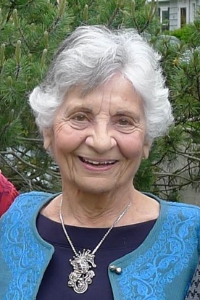

Shushan Teager (1931-2024)
Shushan Yeni-Komshian Teager departed this world on the morning of August 6, 2024. Born in Beirut, Lebanon to Helen and Dr. Hovsep Yeni-Komshian, Shushan was the oldest of five children. She grew up speaking Armenian, English, French, and Turkish, none of which served her well when she started primary school at the British Syrian Training College (BSTC), a missionary run school where classes were taught in Arabic. In 1949, she left Lebanon to enroll at Wellesley College where she earned a BS in Chemistry in 1952 with the goal of attending medical school. In that era, however, acceptance was not an easy task for either women or foreign students, so she pivoted, enrolling at MIT where she earned a degree in chemical engineering, and more importantly met her future husband, Herbert M. Teager through a fateful meeting at the MIT Armenian Students Association. For him, it was love at first heated discussion. For her, some convincing was in order, but not much. They married in 1953. For a brief time, she worked in Cambridge, developing compounds to seal bottled beverages, after which she and her husband moved to Valejo, California, where he served as a Lieutenant in the United States Navy, and she was employed as his Chief Civilian Assistant. Together they pioneered the use of computers in the construction of nuclear submarines, most notably, the USS Sargo (SSN-583). It marked the beginning of a professional partnership that lasted over three decades.
After Herbert completed his military service, the couple moved to Watertown, Massachusetts, where they started a family. Shushan managed to balance the demands of raising two boys while working beside her husband as a Research Associate first at MIT, and later at Boston University Medical Center, where he was a Professor in Chief of the Bio-Medical Engineering Department. It was her responsibility not just to help with his research in speech and hearing, but also to keep his laboratory afloat financially through meticulous editing of grant applications and scientific papers. She also managed to make time to take on consulting work, writing computer programs for research in sickle cell anemia.
In 1990, tragedy struck with the loss of her husband. Shushan pivoted yet again, traveling extensively, attending classes in Armenian studies at Harvard, and becoming more involved with the National Association of Armenian Studies and Research (NAASR), where she served on the board. In her second career, she mounted exhibits of Armenian handiwork, researched Pre-Christian Armenian traditions, wrote scholarly papers, and eventually published a book The Krajians of Aintab, a history of her mother’s family from the 1700s to the present. In 2004, she welcomed the first of her two grandchildren into the family, and in her inimitable fashion, immersed herself in shaping their educational growth from day one.
Shushan did not limit sharing her passion for learning to just her family. From her earliest days in Lebanon, where her schooling was in a language that no one spoke at home to the very end of her life, where she took tremendous joy building her Farsi vocabulary at the local Persian coffee shop while drinking espresso and savoring almond cookies, her love of learning was both contagious and inspirational. She shared that love with everyone she met, and hopefully left those around her a little happier, and a lot smarter.
She is survived by her siblings, Margo Kaiser, Grace Yeni-Komshian, Haig Yeni-Komshian, and Annie Gubser; her sons, Stephen and Daniel, daughters-in-law Gail Franck and Maria Mahdasian Teager, and her grandchildren Lucinée and Van Teager.
A celebration of life service will be held at the Holy Trinity Armenian Apostolic Church in Cambridge on Sunday September 29th at 2:00pm.
In lieu of flowers, donations may be made to NAASR, the Holy Trinity Armenian Church or the Boston Symphony Orchestra.